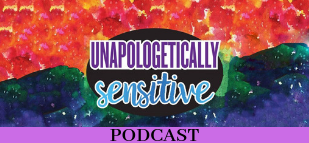TITLE
I Didn’t Feel Seen and Heard, So I Sang the This SucksSong!
GUEST
Solo Episode
EPISODE OVERVIEW
What do we do when we tell someone we’re not feeling seen and heard, and it triggers one of their wounds, and they get defensive? Whose responsibility is it to meet out needs? How can we use mindfulness and curiosity when we are feeling hurt, disappointed and frustrated? Is it possible to sit with discomfort, AND feel gratitude and notice the things that ARE going right?
HIGHLIGHTS
- When we are going through struggles, we tend to want to externalize—find things that are wrong on the outside, instead of going within to see where we need to focus on healing
- We might try to pick a fight with someone, or we find things that others are doing that we feel are wrong
- We can use mindfulness to get curious and try and observe without judgment what’s going on
- Sometimes in relationships we need to sit with the discomfort to see if it’s wounding that we need to work on
- Sometimes it’s important to talk about what’s going on in the relationship in order to have healing happen
- It can hurt, especially as a Highly Sensitive Person (HSP), when we don’t feel seen and heard
- Sometimes this is about the present, but it’s not uncommon for HSPs to have wounding around not feeling seen and heard because this was our experience when we were growing up
- If we have a REALLY BIG reaction to not feeling seen and heard, it may be an indication that it’s about wounding from the past, and not the present
- When I have a 7 reaction to a situation that probably would be 4, there’s a good chance my reaction is about my history, and not the current situation
- We often are skilled at figuring out what others need, and we are skilled at meeting their needs
- This is often how we get our sense of connecting, belonging and self-esteem
- Are we able to identify our own needs?
- Are we able to really show up for ourselves in the ways we show up for others?
- Becoming aware of these patterns and sitting with them, may cause some feelings of anxiety
- We need to learn how to provide reassurances to ourselves—it’s ok to want it from others, and to get it from others, but ultimately, we need to be able to provide this to ourselves
- It’s ok to depend on others
- It’s ok to need others
- When we are processing things that are difficult, it can be harder to ask for what we want. We have a story in our head, and when we get vague feedback (or no feedback) from others, we may use that to validate the story in our head that says we don’t matter; we’re wrong, or whatever that story is
- When we’re feeling stuck, there are ways to move energy either internally, with our bodies or in our home
- When we are in the midst of understanding something that’s uncomfortable, we may tell ourselves that we’re ruminating. Maybe we’re just processing deeply because we want to understand, and we want to heal
- It’s all about what we tell ourselves. We do better when we are kind to ourselves
- We make unconscious agreements with others like—I’m going to be here for you, and I expect you to be here for me
- This doesn’t always work out
- We may feel we are doing this out of love or generosity, but when the other person doesn’t reciprocate and we become really upset, it could be an indication that we had an unconscious agreement with them, and they broke the agreement
- If we are feeling resentment, that can be another indicator that the agreement was broken
- We may feel powerless, angry, frustrated and disappointed when these things happen. That’s totally normal!
- How do we hear ourselves, so we feel heard and seen?
- You can make up an it sucks song to sing to yourself
- We may have fantasies about how we want the other person to hurt or to feel what we’re feeling. This is normal. We don’t have to act on it
- We can feel frustration, hurt and disappointment, AND also be experiencing things in life that work!
- We tend to focus on what’s not working, and we miss the “both, and”
- When we can see what’s not working and what is working (the both and), we can cultivate compassion and it gives us some distance and perspective
- We get to decide what is working for us
- We have choice; we have power
- We can be sad and disappointed that people aren’t there for us, and we can find ways to soothe and be ok
- Sometimes things suck, so you get to make up your own it sucks song
PODCAST HOST
Patricia Young hosts the podcast Unapologetically Sensitive, and works with Highly Sensitive People (HSPs) helping them to understand their HSP traits, and turning their perceived shortcomings into superpowers. Patricia is passionate about providing education to help HSPs and non-HSPs understand and truly appreciate the amazing gifts they have to offer. Patricia works globally online with HSPs providing coaching. Patricia also facilitates online groups for HSPs that focus on building community and developing skills (identifying your superpowers, boundaries, perfectionism, dealing with conflict, mindfulness, embracing emotions, creating a lifestyle that supports the HSP, communication and more).
LINKS
Online HSP Course– https://unapologeticallysensitive.com/hsp-online-groups/
San Diego Meetup—Saturday September 7, 2019 10 am – noon https://www.meetup.com/Unapologetically-Sensitive-Meetup/events/264112525/
Website–www.unapologeticallysensitive.com
Facebook– https://www.facebook.com/Unapologetically-Sensitive-2296688923985657/
Facebook group Unapologetically Sensitive– https://www.facebook.com/groups/2099705880047619/
Instagram– https://www.instagram.com/unapologeticallysensitive/
Youtube– https://www.youtube.com/channel/UCOE6fodj7RBdO3Iw0NrAllg/videos?view_as=subscriber
e-mail– unapologeticallysensitive@gmail.com
Show hashtag–#unapologeticallysensitive
Music– Gravel Dance by Andy Robinson www.andyrobinson.com

